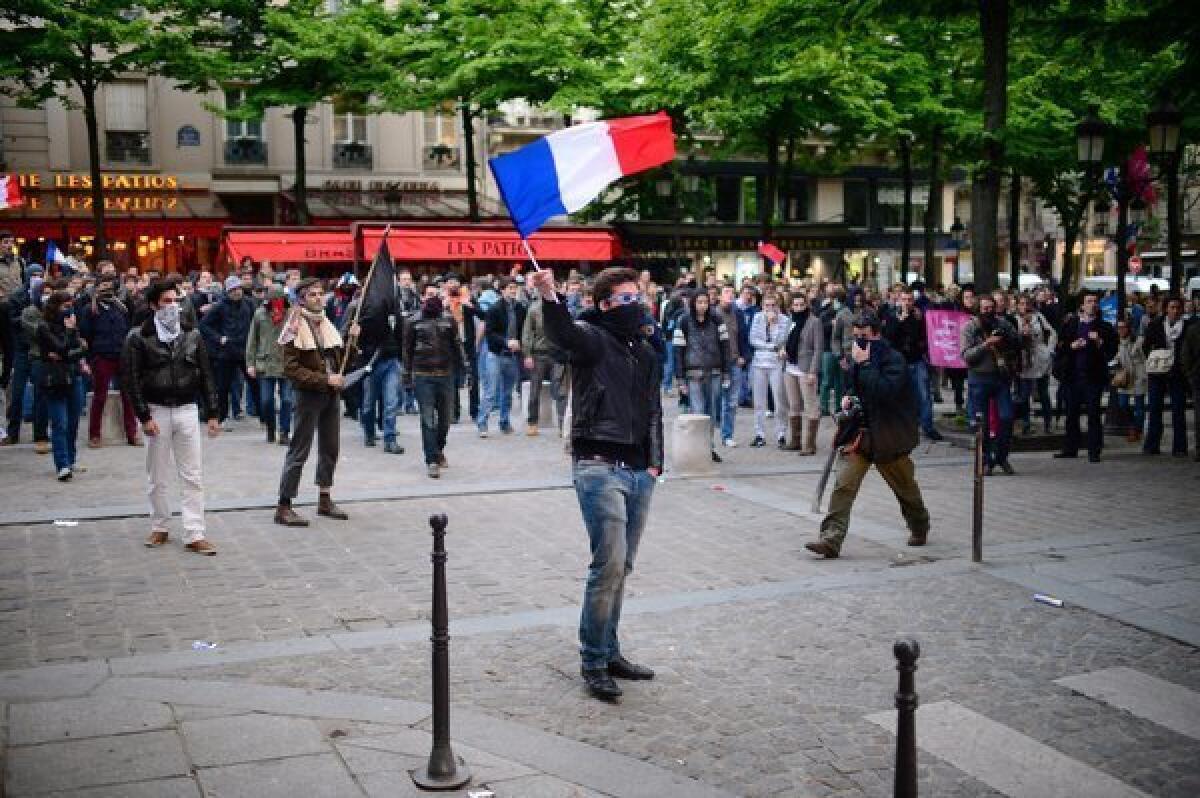French president signs law allowing same-sex marriage

- Share via
PARIS -- French President Francois Hollande on Saturday signed a law allowing same-sex couples to marry and adopt, after months of sometimes violent protests and the vehement opposition of the country’s Roman Catholic Church leaders.
The controversial legislation finally passed into the statute books after the country’s Constitutional Council rejected a challenge from a right-wing opposition party on Friday, the International Day Against Homophobia.
Officials told journalists they expect the first same-sex marriages to take place toward the end of the month.
“I have taken the decision; this is the law of the republic, it is time to respect it,” Hollande said Saturday. “I want the law to apply throughout the land, in full, and I will not accept any disruption of these marriages.”
Prime Minister Jean-Marc Ayrault used Twitter to express his pleasure at the bill becoming law. “I wish all future couples great happiness,” he tweeted.
Jean-Francois Cope of the opposition Union for a Popular Movement (UMP) party said he regretted the Constitutional Council’s decision but would respect it.
Hollande made the legislation known as the “marriage for all” bill a pillar of his election campaign a year ago. His government pushed the measure through in the face of ferocious opposition.
They were just 14 words that entered into France’s Civil Code on Saturday -- “Marriage is a contract between two people of different sex or the same sex” -- but since November, when the bill was first introduced in Parliament, those words had caused a wave of national anger and angst.
In January, at least 340,000 demonstrators took to the streets of Paris to protest against the bill as the lower house of Parliament, the National Assembly, began its debate.
In the assembly, opponents offered numerous amendments and dragged out often ill-tempered arguments, sometimes through the night. Angry words, insults and very nearly punches were exchanged between lawmakers.
Rejecting the opposition’s arguments, the Constitutional Council declared in its ruling Friday that the measure aimed “in the name of the principle of equality, to allow homosexual couples to marry and benefit from the legal status linked to marriage.” It stated that the definition of “marriage” remained the same, and that homosexual couples would have the “same protection in the event of divorce.”
On Saturday, the leader of the protest movement, a comedian calling herself Frigide Barjot, said the law was a “provocation” and that France had “changed civilization.” She pledged to maintain opposition to the law with a series of national demonstrations next weekend in “defense of the family.”
“Our battle continues,” Barjot told journalists.
Successive opinion polls have shown that French public opinion, by a small majority, supports same-sex marriage. However, a small majority also opposes the part of the bill law allowing homosexual couples to adopt, according to the polls.
France is now the ninth European country and 14th in the world to allow same-sex marriage. The legislation is widely viewed as the most significant social reform in France since the abolition of the death penalty in 1981.
Bertrand Delanoe, the mayor of Paris, who is homosexual, told journalists Saturday that the law brought a “new step in equality” to France.
“I hope that the time of polemic and confrontation will be put behind us and that each person will find it in their heart to respect the new law,” he said.
ALSO:
North Korea launches 3 short-range missiles
Italian court told about Berlusconi’s ‘bunga bunga’ parties
OAS study says countries should consider decriminalizing drug use
More to Read
Sign up for Essential California
The most important California stories and recommendations in your inbox every morning.
You may occasionally receive promotional content from the Los Angeles Times.










